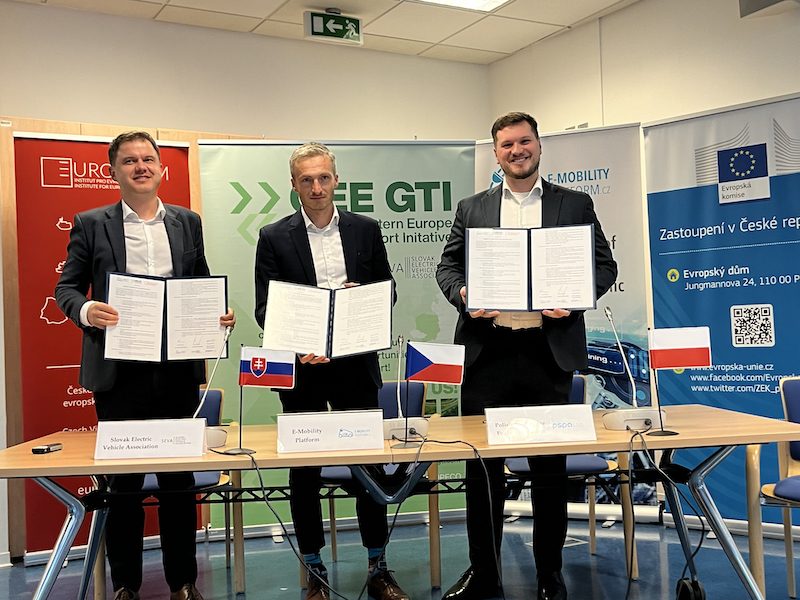An 8 point declaration: “E-MOBILITY: An OPPORTUNITY for Central & Eastern Europe (CEE): A Call to Action” was signed by leaders of the Czech E-mobility Platform, Polish Alternative Fuels Association, and Slovak EV Association yesterday, concluding a conference of the same name. The Call to Action outlines what countries of CEE and the EU must do in order to seize the opportunities presented by the e-mobility transition and the clean industrial revolution underway. The conference was especially timely with the Czech Presidency of the EU Council and against the backdrop of the ongoing war in Ukraine, a related energy crisis, and the worsening climate crisis.
The conference also brought together leading officials from the European Commission & European Investment Bank, the Czech Ministry of Ministry of Industry and Trade, leading regional companies including Skoda Auto and GreenWay, and other emobility experts from Brussels and the CEE. Through case studies and debates, panelists and attendees shared what is happening in the region already, what is working well and what is not, what countries and communities can do to strengthen their position and what the EU can do to provide proper legislative and financial tools to support the e-mobility transition in CEE.
The transition to E-mobility is happening more slowly in CEE than other parts of Europe and even faces resistance from some quarters, which was heavily debated at the conference. Although some CEE policymakers might pretend as if this path is not yet decided – especially challenging since leadership is one of the characteristics most needed to seize the e-mobility opportunity, the private sector realizes the opposite. Long term investment decisions and innovation cycles mean no more new generations of ICE engines will be produced in the future. The countries of CEE must not remain a dwindling island of ICE production but must seize the opportunity presented by the transition to e-mobility or risk losing out and being left behind. The window for seizing this opportunity in Europe is closing, as was stated by EU Vice Commissioner Sefcovic in his opening remarks.
Taken together, the 3 regional associations represent 253 member companies, research institutes and organizations working actively across the e-mobility value chain in their respective markets. These companies are seizing the opportunity, and the time is now for the countries of CEE to do the same.
Lukáš Folbrecht, Secretary of the CZ Electric Mobility Platform: In Western and Northern Europe as well as in other parts of the world, e-mobility is developing dynamically thanks to the very active support of governments. Not only gigafactories for the production of batteries, but also the entire supply chain is being transformed, new industries and jobs are being created. The opportunities that e-mobility offers must be actively seized. With a joint declaration, we call on the political sphere, governments, the leadership of regions, cities and municipalities and other institutions to have more courage and implement the steps needed to transform industry and transport.
Patrik Krizansky, Director, Slovak Electric Vehicle Association: In Slovakia, we are updating our regulations in energy, building and more to provide the right regulatory framework for e-mobility and new industry to grow and we’re using funds from the Recovery & Reinvestment Facility to support the rollout of charging infrastructure. It’s moving, but slowly, and the EU can help further by helping bring EVs to market via the CO2 standards regulation, fleet electrification proposal and setting high early targets in AFIR for charging infrastructure to help people overcome their fear of “where will I charge?” We are proud to ally with the CZ platform and PSPA to share our members‘ experiences and insights with others in the region.
Aleks Rajch, Deputy Director, Polish Alternative Fuels Association: 20% of Europe’s entire heavy duty vehicle (HDV) fleet is Polish, up to 30% of all mass goods in Europe are transported by Polish operators and CEE is the main transit area in terms of the TEN-T which will host the heavy duty transport. Electrification of the HDV fleet – which has already started – is therefore especially important for CEE. The high power needs of the HDV fleet bring up the topic of the grid capacity – The Polish national grid is inflexible and overburdened, problems also shared by other CEE countries. We need to address this urgently through updating DSO regulations, improving connection times and opening up more suitable locations. Working together with our neighboring countries via our joint declaration to resolve these twin issues will significantly accelerate the electrification of road transport for the entire EU and support the efficient implementation of AFIR – hopefully in as ambitious a way as possible.
